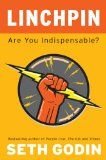Linchpin and the End of the Résumé
Seth Godin’s Book Linchpin, asking the question “Are You Indispensable?” is a Challenging Read
When offered the chance to have a new book for my birthday recently, I wavered between a work of fiction and Seth Godin’s Linchpin: my first thought was to indulge my love of literature and take the novel.
 I’m happy that I chose Linchpin instead. The book’s central premise, as I understand, is that to be successful in the world we are now in and as it is developing, you need to either be already an indispensable linchpin or set about becoming one.
I’m happy that I chose Linchpin instead. The book’s central premise, as I understand, is that to be successful in the world we are now in and as it is developing, you need to either be already an indispensable linchpin or set about becoming one.
I would see this book as essential reading for anyone in the job market: the book’s subtitle is “Are You Indispensable? How to drive your career and create a remarkable future”. But the implications go beyond the kind of career that entails getting and keeping a job: the concepts developed and illustrated in the book are just as relevant for anyone creating or developing a business or professional practice.
The world has changed: have we?
With the ongoing impact of the global financial crisis, we live in a time when many people have either lost what they thought were quite secure jobs or have become very fearful of that happening any day now.
So how should anyone deal with that?
If you were to go online and accept even a small fraction of the huge amount of advice offered to job-seekers, my guess is you might well say the first thing to do is to ensure you have a good résumé and that it has all the key elements that a good résumé is supposed to have. The subtext of this kind of advice is, things are tough so you need to fit in with the way things are done (read: as decreed by HR departments) and do things in the accepted manner.
But if you read Linchpin you will find why fitting in doesn’t work anymore – or even where it still does there can be no confidence that it will last the distance:
Now we live in a world were all the joy and profit have been squeezed out of following the rules. Outsourcing and automation and the new marketing punish anyone who is merely good, merely obedient and merely reliable. – page 8
And if you follow Godin’s advice you won’t even have a résumé.
Scary thought. You *have* to have a résumé don’t you, if you want to get an interview?
Godin admits this is controversial, and then declares:
“…if you’re remarkable, amazing, or just plain spectacular, you probably shouldn’t have a résumé at all.” – page 71
He argues, persuasively to my mind, that if you have experience in doing the things that make you a linchpin, a résumé will actually hide that fact.
He offers other options to demonstrate your linchpin status. They include such things as “…creating a blog that is so insightful about your area of expertise that others refer to it.”
I suspect that for people who have been fully conditioned to think of themselves as unremarkable, steady, compliant, able to fit in, this book could be disturbing or just make no impact at all.
But for people who have some serious ambition, good self-esteem and the belief that they can make a difference and be genuine linchpins, the book will be a great read and a source of inspiration and practical ideas to imagine and create a career that goes way beyond the limitations and risks of me-tooism.
If you’ve read Linchpin I would love to hear your impressions of it.
Des Walsh
Business coach and digital entrepreneur. With coach training from Coachville.com and its Graduate School of Coaching, and a founding member of the International Association of Coaching, Des has been coaching business owners and entrepreneurs for the past 20 years. Over the same period he has also been actively engaged in promoting the business opportunities of the digital economy. He is a certified Neurolinguistic Programming (NLP) coach, and a certified specialist in social media strategy and affiliate marketing.
How interesting. I gave up my resume in 1995 when I started my first Internet company & people kept asking me for my resume thinking I was looking for a job. I finally just said “I'm president of my own company – I have a bio but not a resume.” I've tried to keep up a CV just to keep a history of my big projects. And I think my LinkedIn account by default acts as a resume of sorts.
I think if you want a job, you still need that resume. If someone wants to hire you because of your expertise, they won't care about the traditional resume – your work, reputation and profile will speak for itself.